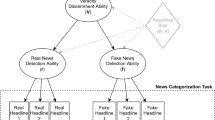Abstract
The amount of content, both on and offline, to which people in reasonably affluent nations have access has increased to the point that it has raised concerns that we are now suffering from a harmful condition of ‹information overload.’ Although the phrase is being used more frequently, the concept is not yet well understood – beyond expressing the rather basic idea of having access to more information than is good for us. This essay attempts to provide a philosophical explication of the concept of information overload and is therefore what philosophers call ‹conceptual analysis’ – a task that, along with normative ethical analysis, is distinctive to Anglo-American style analytic philosophy. I will begin with an analysis of the atomic concepts expressed by the terms ‹information’ and ‹overload’ and then attempt to give a philosophical explanation of the concept of information overload that more precisely identifies exactly what the condition amounts to.
Similar content being viewed by others
References
Brod C. (1984) Technostress: The Human Cost of the Computer Revolution. Addison-Wesley, Reading, MA
Buckland M. (1991) Information as Thing. Journal of the American Society of Information Science 42(5): 351–360
Bush V. (1991) As We May Think. In: J.M. Nyce, P. Kahn (eds), From Memex to Hypertext: Vannevar Bush and the Mind’s Machine, pp. 85–107. Academic Press, Inc., Boston
Floridi L. (2004) Information. In: L. Floridi (ed), The Blackwell Guide to the Philosophy of Computing and Information. Blackwell Publishing, Oxford
Frankena W.K. (1966) The Concept of Morality. The Journal of Philosophy 63(21): 688–696
Himma K.E. (2004) The Moral Significance of the Interest in Information: Reflections on a Fundamental Right to Information. Journal of Information, Communication, and Ethics in Society 2(4): 191–202
K.E. Himma. Reconsidering a Dogma: Conceptual Analysis, the Naturalistic Turn, and Legal Philosophy. In R. Harrison, editor, Current Legal Issues. Oxford University Press, Oxford, 2008 (forthcoming) (Preprint available at http://www.papers.ssrn.com/sol3/papers.cfm?abstract_id= 727445)
F. Jackson. From Metaphysics to Ethics: A Defence of Conceptual Analysis. Oxford University Press, 1998
D. Levy. To Grow in Wisdom: Vannevar Bush, Information Overload, and the Life of Leisure. In Proceedings of the 5th ACM/IEEE-CS Joint Conference on Digital Libraries, pp. 281–286. Denver, CO, 2005
D.M. Levy. More, Faster, Better: Governance in an Age of Overload, Busyness, and Speed. FirstMonday (Special Issue #7: Command Lines: The Emergence of Governance in Global Cyberspace), 2006 (Available at http://www.firstmonday.org/issues/special11_9/)
D. Levy. Information Overload. In K.E. Himma and H. Tavani, editors, The Handbook of Information and Computer Ethics, Wiley, 2008
J. Nielsen. Information Pollution. Jakob Nielsen’s Alertbox, August 11, 2003 (Available at: http://www.useit.com/alertbox/20030811.html Accessed September 14, 2006)
Scheuerman W.E. (2004) Liberal Democracy and the Social Acceleration of Time. The Johns Hopkins University Press, Baltimore
Scheuerman W.E. (2005) Busyness and Citizenship. Social Research 72(2): 447–470
C.E. Shannon. A Mathematical Theory of Communication. Bell System Technical Journal, 27: 379–423, 623–656, July and October, 1948
Thorngate W. (1988) On Paying Attention. In: W. Baker, L. P. Mos, H. V. Rappard, H. J. Stam (eds), Recent Trends in Theoretical Psychology: Proceedings of the Second Biannual Conference of the International Society for Theoretical Psychology, pp. 247–264. Springer-Verlag, Berlin
M.J. van den Hoven. Equal Access and Social Justice: Information as a Primary Good. In ETHICOMP95: An International Conference on the Ethical Issues of Using Information Technology, pp. 1–17. De Monfort University, Leicester, 1995
Author information
Authors and Affiliations
Corresponding author
Rights and permissions
About this article
Cite this article
Himma, K.E. The concept of information overload: A preliminary step in understanding the nature of a harmful information-related condition. Ethics Inf Technol 9, 259–272 (2007). https://doi.org/10.1007/s10676-007-9140-8
Received:
Accepted:
Published:
Issue Date:
DOI: https://doi.org/10.1007/s10676-007-9140-8




